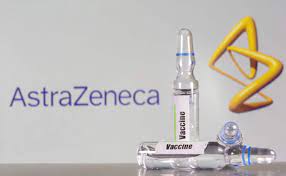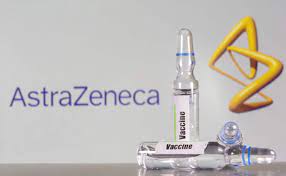
Despite "setbacks," the head of the pharmaceutical company behind the Oxford-AstraZeneca Covid-19 vaccine says the vaccination saved a million lives. Pascal Soriot, CEO of AstraZeneca, also addressed studies linking the vaccination to uncommon but serious blood clots.
In retrospect, he stated, "I don't think I would do anything differently than what we did."
Many European and Asian countries have set age restrictions on the vaccine, and the United States has yet to approve it. Soriot was knighted last week in the Queen's Jubilee birthday honours for his services to science.
AstraZeneca stated in a statement on Wednesday that he was honoured for services to the UK in "life sciences and leadership in the worldwide response to the Covid epidemic."
During a recent visit to Singapore, Soriot, the chief executive of the British-Swedish firm, told the BBC that the vaccine's rapid development and distribution saved a million lives from Covid-19.
He noted this despite "setbacks," such as last year's revelations about rare but dangerous blood clots.
"We decided to do it at no profit, we decided to partner with a network of partners around the world to scale up manufacturing. Despite the setbacks, we delivered three billion doses [of the vaccine] and saved a million lives," he said.
"When you launch yourself in something like this, which is a huge undertaking, you have to accept that you will have setbacks," he added.
The vaccine was developed in partnership with the University of Oxford by AstraZeneca. The UK was the first to approve it in December 2020, as governments raced to curb the rising incidence of coronavirus illnesses.
Nearly half of the adult population in the United Kingdom has gotten two doses of the vaccine, which is thought to have saved more lives than the Pfizer and Moderna vaccines combined.
After the AstraZeneca jab was related to exceedingly rare blood clots, UK regulators recommended it for over-40s last year.
The chance of having a blood clot was estimated to be four in one million by the UK's Medicines and Healthcare products Regulatory Agency.
However, several other European nations have stopped using the vaccination. They only withdrew their prohibitions and imposed age limits on the vaccine when European Union (EU) regulators determined that the benefits exceeded the risks.
Because of the restrictions, AstraZeneca's vaccine is now licenced for a narrower population segment than numerous other Covid vaccinations.
Soriot said: "It is important to remember that those side effects are extremely rare. When you start vaccinating millions of people, very rare side effects will emerge that remain very rare. And this is common to all vaccines."
Last month, EU officials approved the vaccine's use as a "third dosage booster" for adults.
Despite the fact that the vaccine may be properly refrigerated for up to six months, numerous African countries have destroyed or returned their inventories, claiming that they could not utilise the vaccine before it expired.
Meanwhile, Soriot stated that in less developed economies, such as Asia, some people are hesitant to get vaccinated.
"In the emerging, developing countries, there's quite a bit of hesitancy. Of course, China is a different story where they're still managing a 'zero-Covid' policy. So it depends where you are in the world," he added.
Soriot stated that the company was still in talks with US authorities about submitting the vaccine for clearance in the country, despite the fact that the "need for a new vaccine is significantly less in the US than it was."
"Today, there is [an] over supply. We do have too many vaccines. So the question is how do we deliver? How do we administer those vaccines and how do we manage vaccine hesitancy? So we are in a very different place," Mr Soriot said.
As the disease became prevalent, AstraZeneca said in November that it would discontinue delivering its Covid vaccination to countries on a non-profit basis. It stated that it anticipated earning a small profit from the vaccine through a series of for-profit agreements.
The vaccine will continue to be provided to poorer countries on a non-profit basis.
(Source:www.bbc.com)
In retrospect, he stated, "I don't think I would do anything differently than what we did."
Many European and Asian countries have set age restrictions on the vaccine, and the United States has yet to approve it. Soriot was knighted last week in the Queen's Jubilee birthday honours for his services to science.
AstraZeneca stated in a statement on Wednesday that he was honoured for services to the UK in "life sciences and leadership in the worldwide response to the Covid epidemic."
During a recent visit to Singapore, Soriot, the chief executive of the British-Swedish firm, told the BBC that the vaccine's rapid development and distribution saved a million lives from Covid-19.
He noted this despite "setbacks," such as last year's revelations about rare but dangerous blood clots.
"We decided to do it at no profit, we decided to partner with a network of partners around the world to scale up manufacturing. Despite the setbacks, we delivered three billion doses [of the vaccine] and saved a million lives," he said.
"When you launch yourself in something like this, which is a huge undertaking, you have to accept that you will have setbacks," he added.
The vaccine was developed in partnership with the University of Oxford by AstraZeneca. The UK was the first to approve it in December 2020, as governments raced to curb the rising incidence of coronavirus illnesses.
Nearly half of the adult population in the United Kingdom has gotten two doses of the vaccine, which is thought to have saved more lives than the Pfizer and Moderna vaccines combined.
After the AstraZeneca jab was related to exceedingly rare blood clots, UK regulators recommended it for over-40s last year.
The chance of having a blood clot was estimated to be four in one million by the UK's Medicines and Healthcare products Regulatory Agency.
However, several other European nations have stopped using the vaccination. They only withdrew their prohibitions and imposed age limits on the vaccine when European Union (EU) regulators determined that the benefits exceeded the risks.
Because of the restrictions, AstraZeneca's vaccine is now licenced for a narrower population segment than numerous other Covid vaccinations.
Soriot said: "It is important to remember that those side effects are extremely rare. When you start vaccinating millions of people, very rare side effects will emerge that remain very rare. And this is common to all vaccines."
Last month, EU officials approved the vaccine's use as a "third dosage booster" for adults.
Despite the fact that the vaccine may be properly refrigerated for up to six months, numerous African countries have destroyed or returned their inventories, claiming that they could not utilise the vaccine before it expired.
Meanwhile, Soriot stated that in less developed economies, such as Asia, some people are hesitant to get vaccinated.
"In the emerging, developing countries, there's quite a bit of hesitancy. Of course, China is a different story where they're still managing a 'zero-Covid' policy. So it depends where you are in the world," he added.
Soriot stated that the company was still in talks with US authorities about submitting the vaccine for clearance in the country, despite the fact that the "need for a new vaccine is significantly less in the US than it was."
"Today, there is [an] over supply. We do have too many vaccines. So the question is how do we deliver? How do we administer those vaccines and how do we manage vaccine hesitancy? So we are in a very different place," Mr Soriot said.
As the disease became prevalent, AstraZeneca said in November that it would discontinue delivering its Covid vaccination to countries on a non-profit basis. It stated that it anticipated earning a small profit from the vaccine through a series of for-profit agreements.
The vaccine will continue to be provided to poorer countries on a non-profit basis.
(Source:www.bbc.com)





